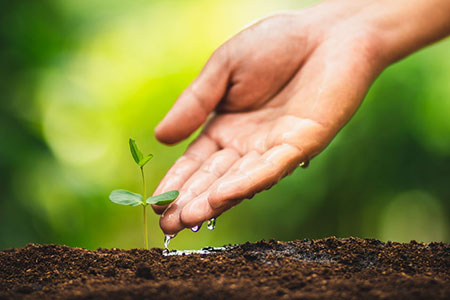Questions That Truly Satisfy The Self
 Once upon the ages, over 5,000 years ago, the world’s great saints, sages, and spiritual scholars assembled at a place called Naimisharanya. This sacred forest was known to them as the energetic hub of the Universe, from where the benefits of their practices, sacrifices, and speech would extend to all the world’s inhabitants. Thus, they gathered here specifically with the intention of welfare for every living being.
Once upon the ages, over 5,000 years ago, the world’s great saints, sages, and spiritual scholars assembled at a place called Naimisharanya. This sacred forest was known to them as the energetic hub of the Universe, from where the benefits of their practices, sacrifices, and speech would extend to all the world’s inhabitants. Thus, they gathered here specifically with the intention of welfare for every living being.
By dint of their self-realization, these wise seers were gifted with foresight of the Age of Quarrel in which we now live. They considered that humans of this time would be short-lived and plagued by various mental, bodily, and natural disturbances. So, they contemplated what they could do to bring relief and the highest good for all in the many generations to follow.
They selected Suta Goswami as the most elevated among them, offered him a seat of esteem, and inquired from him with great respect. Because Suta Goswami was free from vice, learned in all scriptures and teachings of physical, metaphysical, and spiritual knowledge, and properly guided by the great masters, who had gone before him, the sages regarded him as most qualified to enlighten them about the Supreme Truth. Therefore, they humbly approached him with inquiries toward that end.
The sages began with six questions which they had ascertained to be of primary importance:
1. What is the absolute and ultimate good for people in general?
2. What is the essence of all scriptures and prescribed practices, by which the hearts of every living entity may be fully satisfied?
Stepping Into Love With Faith And Trust
 I meditate on moving by faith every day, creating a course of embodying inner trust. I step out into the fresh air and sunshine, surrounded by the artistic heart of God in nature, and I pray for the divine guidance of the day.
I meditate on moving by faith every day, creating a course of embodying inner trust. I step out into the fresh air and sunshine, surrounded by the artistic heart of God in nature, and I pray for the divine guidance of the day.
Day by day, step by step, the path forward is revealed. It is often shown and channeled to me in the simplest of ways: a whisper in the wind; a sparkle in the water; a bird dancing to her own song in the sky.
Each message received highlights an inner sensing and an external physical movement to integrate it into being. The course starts within, stepping into the sacred space of the self.
The power of movement to internalize a concept is profound. I invite you to take a moment now to literally step into yourself, the sanctuary of your soul.
Simply close your eyes, take a few deep breaths to clear and cleanse your mind, and then begin to mindfully move forward, consciously feeling the contact of the soles of your feet with the ground or floor beneath you.
Feel its temperature, its texture, and the firmness or softness of its support. Notice the articulation in your foot as the heel lifts, presses through the ball of the foot, rises, reaches, and then lowers again until the toes, ball, and heel touch down and plant into place.
Take three slow steps like this, imbued with the intention of traveling deeper into your true self through each one of them. Let the third step bring your feet to join one another side by side, marking your internal sacred space.
Allow yourself some still silent time to stand there, grounded in your own awareness. Keep your eyes closed, your attention inward, and your breathing gentle, as you feel the sturdiness of your legs, and the length and strength of your spine supporting you. Just be there.
Seeing Yourself As You Truly Are
 The art of ‘being seen’ begins within. It is not in the eyes, or heart, of an external beholder. It is the grace of being able to see oneself through the Divine Eyes of our Creator.
The art of ‘being seen’ begins within. It is not in the eyes, or heart, of an external beholder. It is the grace of being able to see oneself through the Divine Eyes of our Creator.
Every soul is unique. No two are the same. Each soul emanates from the Supreme Loving Source to offer its unique beauty and pleasure to God in an incomparable, individual way. When we look at ourselves through this lens, the true beauty, light, and power of the spiritual spark of our being shines upon our inner vision.
Relationships offer mirrors too. But what they show vary according to the quality of the reflecting surface. And what we see in them depends upon how well we know, see, and stand in the truth of our own higher self.
For example, if I look at myself in a broken mirror, do I see a crack in my face? I might…if I am not sure of who I am. However, if I know myself to be whole, I can readily recognize that the crack is in the mirror, and not in my face.
Similarly, there are relationships in life that reflect broken images back to us. That does not mean that we are broken, nor that the other person or people involved are broken either. We all have wounds and scars and other gaping holes yet to be healed, or not.
Whatever the case may be, it is the relationship itself that offers up the reflective element. It is the dynamic of exchange that shows itself as either clean, clear, balanced, cracked, smeared, skewed, and so on.
Knowing oneself in truth and wholeness is thus extremely valuable. If we do not possess such certainty of self, we may accept a broken or distorted impression projected by an ill-functioning relationship to be a reflection upon ourselves.
The Karmic Fruit Of Our Past Life Seeds
 To be the architect of our own destiny is a spiritual concept that has been spoken of for thousands of years. The Vedas call it Karma. The Bible refers to it as ‘reaping what you sow.’
To be the architect of our own destiny is a spiritual concept that has been spoken of for thousands of years. The Vedas call it Karma. The Bible refers to it as ‘reaping what you sow.’
Karma is a Sanskrit word that means action, as well as reaction. It has made its way into our everyday language to represent the good or bad we create in life that will eventually come back to us.
However, the true meaning of karma goes much deeper than that. In this life it does refer to ‘sowing and reaping’ in the short-term, but it also extends into the long-term, over thousands of years and many lifetimes.
The Padma Purana, an ancient Hindu encyclopedic text of spiritual truths, compares karma to seeds that are sown and harvested in due course of time. It explains that every activity we perform bears four kinds of effects. The first is merely a seed, the second is not yet fructified, the third is in the process of being fructified, and the fourth has blossomed and is already mature.
The karma we are experiencing today, are the sweet and sour fruits of the past seeds we have planted, – not only in this lifetime, but also from thousands of years and lifetimes before this life.
Therefore, we may not be able to recognize why certain things are happening that seem out of sync with the efforts and energies we are extending in the now. Similarly, it may sometimes be disheartening and difficult to understand why the desired results of our best endeavors do not appear to be coming to fruition.
To thoroughly resolve these misgivings, a broader scope of our soul’s journey before and beyond this one body and lifespan must be considered. Clarity can come with spiritual vision and higher consciousness.



